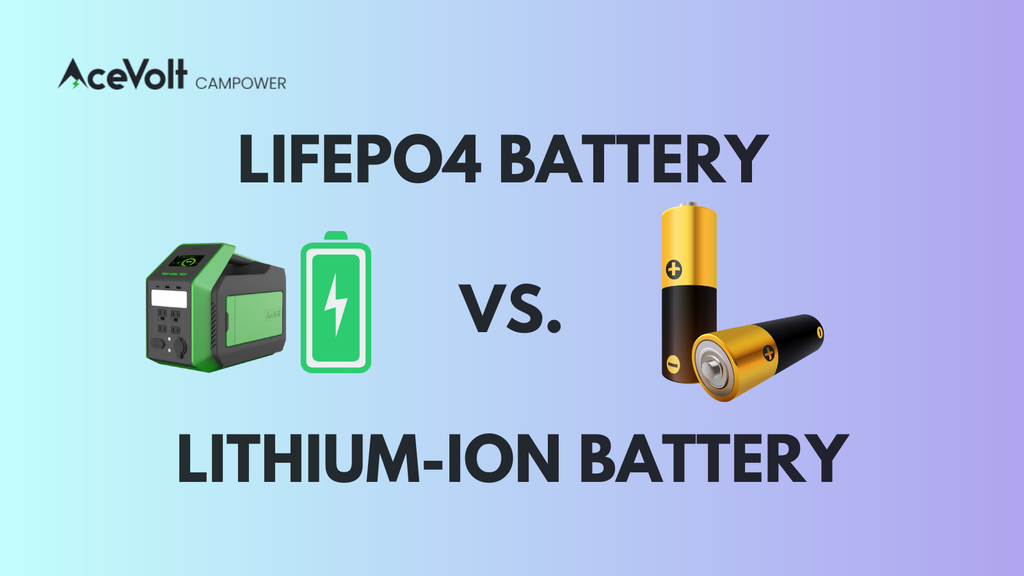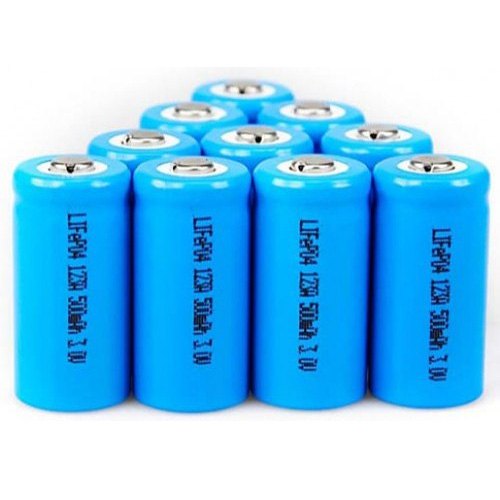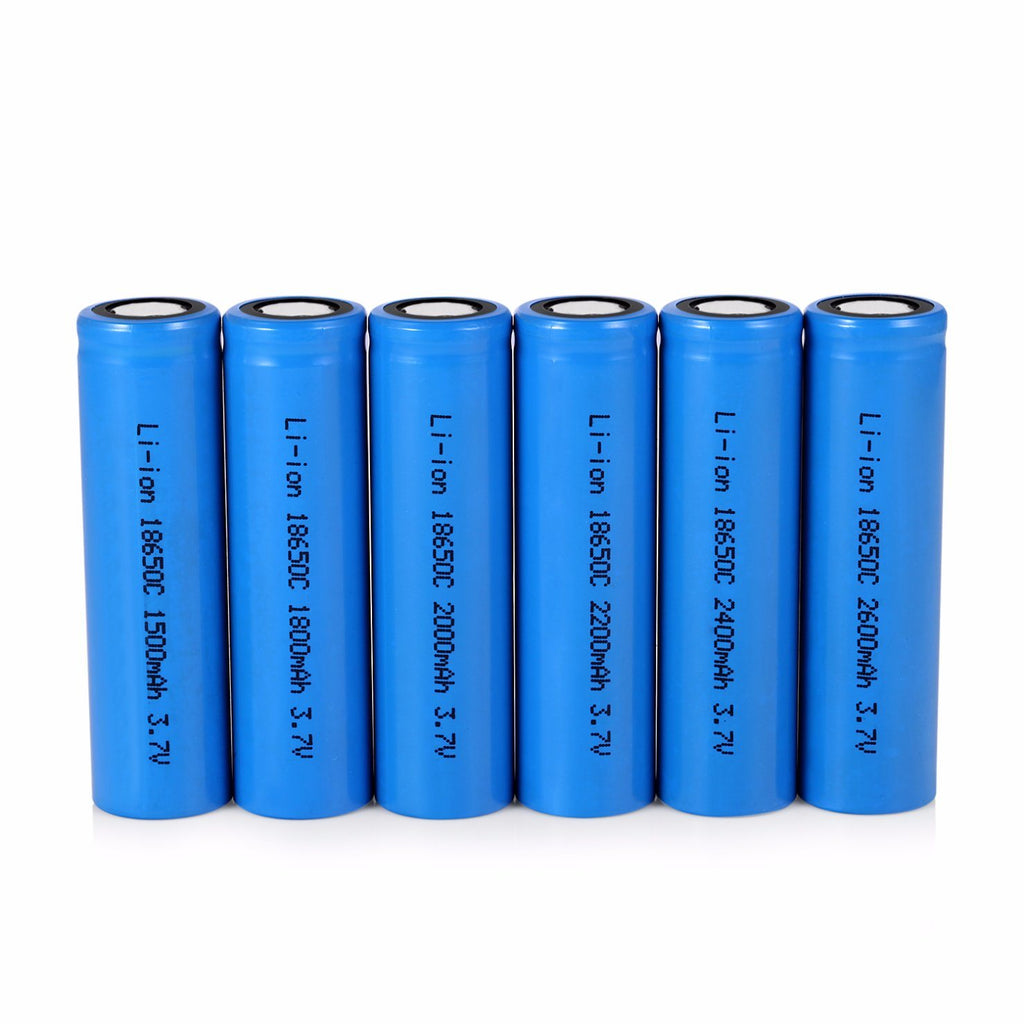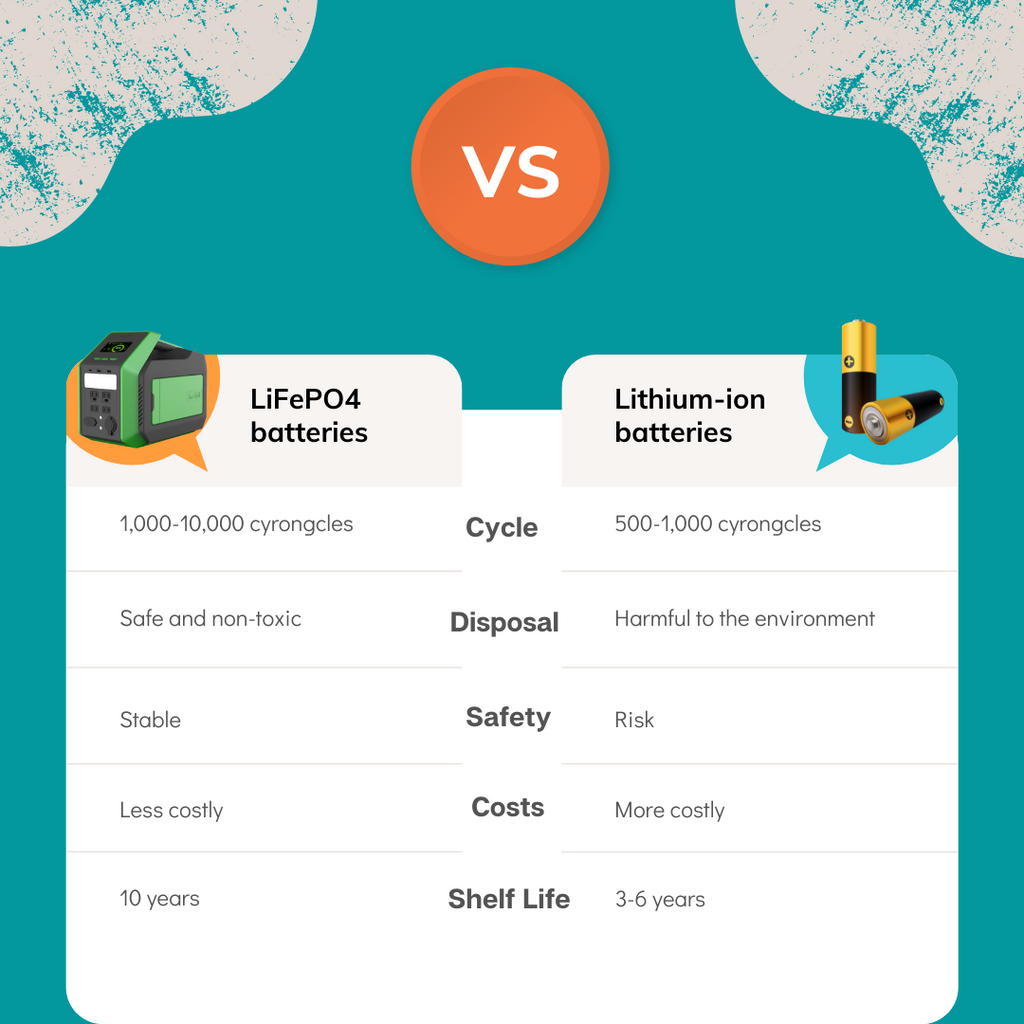
LiFePO4 Battery Vs. Lithium-Ion Battery: Differences And Pros
Introduction
Batteries have solved a big problem for the world as they can retain some energy that can be used to power an electrical or mechanical appliance without a constant external electricity source.
For several years, electrical or mechanical appliances manufacturers have used lithium-ion (li-ion) batteries as their choice batteries. Recently, the Lithium Iron Phosphate (lifepo4) batteries came on board, and they are giving the lithium-ion batteries a run for their money. Why LiFePO4 batteries are trending?
In this article, we will contrast the two battery types to determine their advantages and differences. It is Lifepo4 vs. Li-ion.

What is a LiFePO4 battery?
All lifepo4 batteries are lithium-ion batteries, but not all lithium-ion batteries are lifepo4 batteries. To explain: lifepo4 batteries are lithium-ion batteries with added features that distinguish them from other batteries of the same origin.
These batteries use lithium iron phosphate as the cathode material, and as the anode, it uses graphite carbon electrodes. For lay people, this means that the components of the lifepo4 are different and advanced than the ordinary lithium-ion.
While lithium-ion has a graphite anode, its cathode material is lithium manganese or lithium cobalt dioxide.

LiFePO4 battery vs. Lithium-ion: Differences and Advantages.
There are some differences between lifepo4 and li-ion, and these differences depict the advantages of each battery type over the other. These differences and benefits will be linked to its uses in solar generators for RV or camping.

-
Life Cycle
One of the reasons why devices are costly is the life cycle of the batteries. The manufacturers prefer to fix in a battery whose life cycle is almost the same as the device's life cycle. This would ensure there is no tampering or change of batteries throughout the life cycle of the device.
For lithium ions, the life cycle is quite limited as it has 500-1,000 cyrongcles. Also, the battery's life cycle reduces with the high temperature of the device or its components.
Lithium-Ion Phosphate batteries(LiFePo4) have a higher life cycle than lithium-ion. It has 4 to 5 times more life cycles than lithium ions. It has 1,000-10,000 cyrongcles. It is mildly affected or degraded by high temperatures.
For a solar generator that would be used for a long time on the road or during camping where there are limited sources of recharging, it is essential to get a solar generator whose battery's life cycle is longer and can cope without degrading in any harsh weather or temperature.
-
Disposal
When the battery life ends, or it develops a fault, and there is the need to change it, the batteries disposal's means take a different form.
The components make the disposal quite difficult for the lithium-ion because it is laced with lithium Cobalt dioxide, which is harmful to the environment and humans. More care must be taken to ensure that it is disposed of rightly without any risk of exposure to the environment or humans.
This is not the same case for LiFePo4, which is considered safe for disposal as its components are non-toxic and do not adversely affect the environment and humans. Its disposal does not involve extra costs for the manufacturers or users.
The replacement of the battery in the solar generator will bring about the disposal of the old or damaged battery. The cost of disposing of the battery will determine the type of battery the solar generator uses. For lifepo4, the disposal cost is much lower than solar generators with li-ion batteries.

-
Safety
Manufacturers of products often go for items with the highest safety ratings as they wish to protect their devices' users from injuries that could come from the usage of their device. That is why it is always essential to examine and know the type of battery used in the electrical appliances at home, workplace, etc.
Li-ion has a high energy density which makes it a high risk. It is unstable and has the capability of combusting when overheated or overcharged.
Lifepo4 has a phosphate cathode which makes it incombustible and stable even during overheating and overcharging. It has thermal and chemical stability and does not change temperature even when the device attached to it is higher.
For a solar generator that would involve the movement from one place to another, overheating, and overcharging to ensure the device is fully charged, it is important to go for a battery type that would not become an extra risk to the users.
-
Costs
Cost is always in the thoughts of manufacturers and users whenever they plan to build or buy a device. The cost of a battery type determines the cost of production and hence affects the price at which the product is sold.
Lithium-ion batteries are more costly than LiFePo4 lithium batteries because their raw materials are rarer than LiFePo4. It is also not easy to recycle. Since it has a shorter life cycle, this affects the costs also.
For the LiFePo4 batteries, the raw materials- phosphate and granite carbon electrodes are more common than lithium manganese or lithium cobalt dioxide. It has a longer life cycle than lithium-ion, which means the probability of replacing it during the device's life cycle is slim. The cost of disposing of the battery is lower than li-ion batteries.
For solar generators, the cost of the batteries affects the general price at which the generators are sold. It is logical to state that LiFePo4 solar generators will be cheaper than Li-ion solar generators.
-
Long term storage benefits
There are devices that users only use for special events which come up rarely. When these events do not come up, the devices are not in use. Sometimes, the events come up without notice, and the devices need to be used without much preparation. So, the device's performance depends on how well it retained its last charging, which happened several months ago.
Lithium-ion batteries have a shelf life of about 3-6 years, where it can retain close to the level it was last charged. Lithium Iron Phosphate(LiFePo4) batteries can retain storage for more days. They have a shelf life for at least 10 years.
Solar generators bought for camping or for a journey with the RV with constant electricity will be left in the storage room for months until the next road trip or camping which may be sudden. The users need the best batteries that can retain power for more days, which LiFePo4 seems to do.
| Li-ion | LiFePO4 | |
| Life Cycle | 500-1,000 cyrongcles | 1,000-10,000 cyrongcles |
| Disposal | Harmful to the environment | Safe and non-toxic |
| Safety | Risk | Stable |
| Costs | More costly | Less costly |
| Shelf Life | 3-6 years | At least 10 years |
LiFePo4 Vs. Li-ion Battery Chart
Conclusion
Users of solar generators wish to find the best solar generators with all the benefits lithium iron phosphate offers and additional benefits. Then you should not go too far as the AceVolt Campower 700 provides these advantages adequately.
This solar generator contains 672Wh capacity, which means at a fully charged status, it can charge your laptop fully 9 times or provide a tent light for 50 hours with a good LiFePo4 voltage of 3.6V.
It is a LiFePO4 solar generator which means its battery life and capacity are much higher than the lithium-ion batteries.
It has several ports through which it can be charged, and electricity can be gotten from it.
With 22lbs weight, the AceVolt Camping power station is portable enough for every adult to carry without strain or discomfort.
In retrospect, lifepo4 vs. lithium-ion shows the best battery type for your solar generator and the best solar generator, which will cut costs while giving you the best deal for your money.
Related Product























Leave a comment